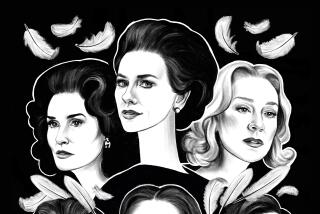BOOK REVIEW : Supporting Characters Who Fail to Lend Any : MERCY, <i> by Echo Heron,</i> Simon & Schuster, $22; 375 pages
- Share via
Catalina Richardson works as a nurse in a San Francisco hospital, in a kind of catch-all ward where she can care for such disparate patients as men dying of lung cancer and AIDS, an old woman with nothing wrong with her but age, a beautiful young woman badly abused by her lover and an adolescent boy who has attempted suicide for no readily apparent reason.
Catalina--or Cat--is big, vibrant, red-headed, middle-aged, has Size 12 feet, smokes dope to unwind, has a couple of divorces under her belt, no children and lives alone. She has a best friend, Nora, to whom she confides all things. Bursting with energy, Cat is nevertheless spinning her emotional wheels. She has been a nurse for 20 years; has seen it all and cured it all. And when she hasn’t been able to cure it, she’s stayed manfully beside a thousand deathbeds until the very end.
She’s a strong woman. She’s always being written up for insubordination. She’s forever trying to pry doctors away from whatever football game they’re watching on television to get them to give the order for something she knows has to be done but doesn’t have the authority to do. She’s “just a nurse,” but she’s also a super woman, totally dedicated to her calling.
The author here, Echo Heron, has been a nurse since 1977. Her first nonfiction book, “Intensive Care: The Story of a Nurse,” obviously called upon her own experience. In some ways, Heron’s career may be copycatting Joseph Wambaugh’s, starting, as it does, in one stressful, dramatic vocation and changing event-filled days into event-filled pages. There is, in fact, the same juxtaposition here between gory death and crazy humor--that gallows humor which comes in so handy when we’re facing the very worst about our lives and our eventual deaths.
But “Mercy” has some serious flaws. While Catalina’s character is well drawn, appealing and consistent, some of the supporting actors here seem a tad embarrassing. A blind black man who sells candy in the hospital lobby and who purports to be Cat’s spiritual guide talks--and thinks--like Uncle Remus. The suicidal adolescent talks--and thinks--in Val-speak--like totally!
And the old lady who supposedly has nothing wrong with her but age acts as if she has a full-blown multiple-personality disorder. Wisecracking and alarmingly contemporary one minute, she flashes back to a highly improbable gangster past, then tells New Age parables to a child whose dad is dying right down the hall.
Was there an editor here? Did he or she explain to Heron about things like point of view? Or was the author as stubborn as Catalina Richardson herself, absolutely damned if she was going to cut out a New Age parable once she’d written it down?
The plot here, as well, could have been toned down a bit. But . . . maybe I’m dead wrong.
Maybe this strong, competent, smart nurse really would journey out to a deserted house in the middle of a howling storm, where a mad rapist killer is most certainly hiding out.
And maybe--even though the phone is dead and the power is off--she really would light a few candles and take a shower , even though she keeps hearing footsteps on the carpet. Anything is possible.
A lot of this doesn’t matter. “Mercy” is a treat to read, the kind of novel you’d feel guilty perusing if you weren’t getting paid to do it; a combination of the old Sue Barton books and the “Texas Chainsaw Massacre,” with a heavy dose of old-fashioned sex.
What can I say? Read the book, and if anybody teases you about it, say you bought it for an aunt--who’s languishing in the hospital, of course.
Next: John Wilkes reviews “Life’s Blood” by Madeline Marget (Simon & Schuster).
More to Read
Sign up for our Book Club newsletter
Get the latest news, events and more from the Los Angeles Times Book Club, and help us get L.A. reading and talking.
You may occasionally receive promotional content from the Los Angeles Times.








